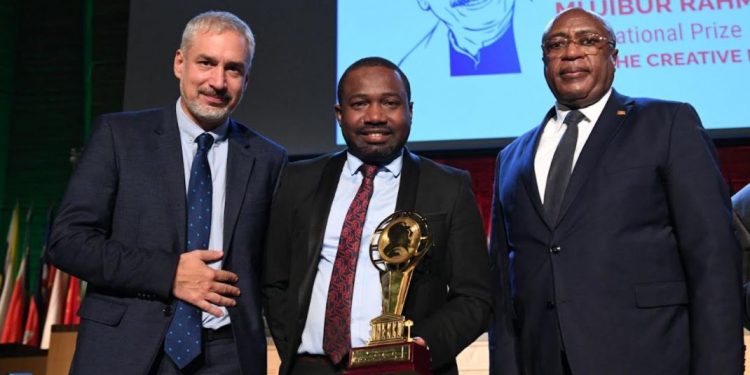Kampala, Uganda: November 12, 2021: MoTIV, East Africa’s largest makerspace headquartered in Kampala, Uganda has won the UNESCO–Bangladesh Bangabandhu Sheikh Mujibur Rahman International Prize for the creative economy.
Established in March 2020 under the Mastercard Foundation’s Young Africa Works in Uganda strategy, MoTIV provides a holistic solution that fosters collaboration in an impactful and sustainable way by providing tools, training, a marketplace, and value chain support to creatives.
Out of 69 institutions nominated for the “creative economy” award, Uganda’s MoTIV emerged as the winner. MoTIV will use the US$50,000 prize money to kickstart a creative fund to unlock increased potential in the sector and support creatives to scale their ideas.
To mark the UN International Year of Creative Economy for Sustainable Development, UNESCO and the Government of Bangladesh inaugurated the “UNESCO-Bangladesh Bangabandhu Sheikh Mujibur Rahman International Prize for the “Creative Economy” biennial prize award named in honor of the founder of the nation of Bangladesh, Sheikh Mujibur Rahman. The awards are intended to recognize, creative institutions globally for their outstanding initiative to promote the engagement of young people within the creative and cultural industries.
Japheth Kawanguzi, the Team Lead at MoTIV said, “This win is not only for MoTIV but for the entire creative community. Uganda’s creative industry consists of talented designers, artisans, and makers who are looking for opportunities and platforms to be able to turn their ideas and skills into products and sustainable businesses. MoTIV was created specifically to overcome challenges within the sector.”
He continued, “We believe that by supporting the growth and development of creatives, we will drive industrial growth and nourish local businesses within the ecosystem, as we strive towards transforming our socio-economic trajectory upwards.”
“The Mastercard Foundation joins in celebrating the catalytic work that MOTIV is doing to support young creatives in Uganda. The recognition they have received is well deserved. It serves as a reminder that across Uganda and Africa, young people are charting unique pathways to opportunity – and by getting behind their aspirations, we can create a multiplier effect that’s unstoppable,” said Samuel Adela, Country Head, Mastercard Foundation .
For local creatives, 2021 has been a year to reflect and refine businesses. Primah Elizabeth Birungi, the proprietor of Kujieleza, a business that offers communication and speech therapy services recently underwent training in MoTIV’s Creative Business Academy, she says the award is a huge win for Uganda’s creative sector.
“In the past, we’ve had the most unguided creatives where people are passionate about things but lack the confidence to showcase or actually start out. There’s not been a lot of mentorship in the past and for me mentorship has been the golden nugget,” she says, adding, “Winning the award means we’re moving towards sustainability as creatives. Uganda is known for having the most creatives whose startups don’t exist beyond two years. The award means we’re picking up everyone and holding them at their weakest. It means we’re reaching towards a safer space for creative businesses to thrive.”
A report by United Nation Educational, Scientific and Cultural Organization (UNESCO) highlights the cultural and creative industries generate annual global revenues of US$2,250 billion and exports of over US$250 billion. The sector has also created nearly 30 million jobs worldwide and employs more people aged 15−29 than any other sector. In Uganda, the creative sector employees more than five million young people aged between 15−29 than any other sector.
When launching the International Prize for the creative economy award, UNESCO stressed the need to protect and support the creative economy in the aftermath of COVID-19. Deputy Chief of Cabinet of the Office of President of General Assembly, Ambassador Farrukh Iqbal Khan, called upon the global community to place creativity and cultural aspects at the center of its policy-making and as a key component of economic and social recovery through partnerships with different sectors and communities, including Indigenous people.
“This is because the creative economy reflects the remarkable innovation and creativity inherent with the world’s most remarkable natural resource: its people. Every society, culture, and country have an abundance of this resource,” he said.










